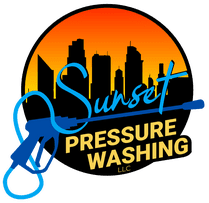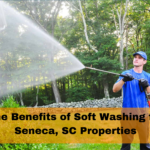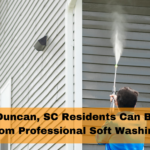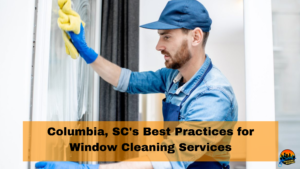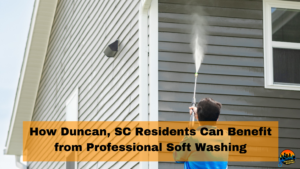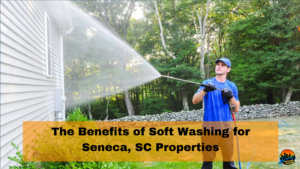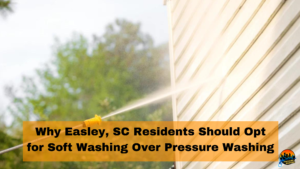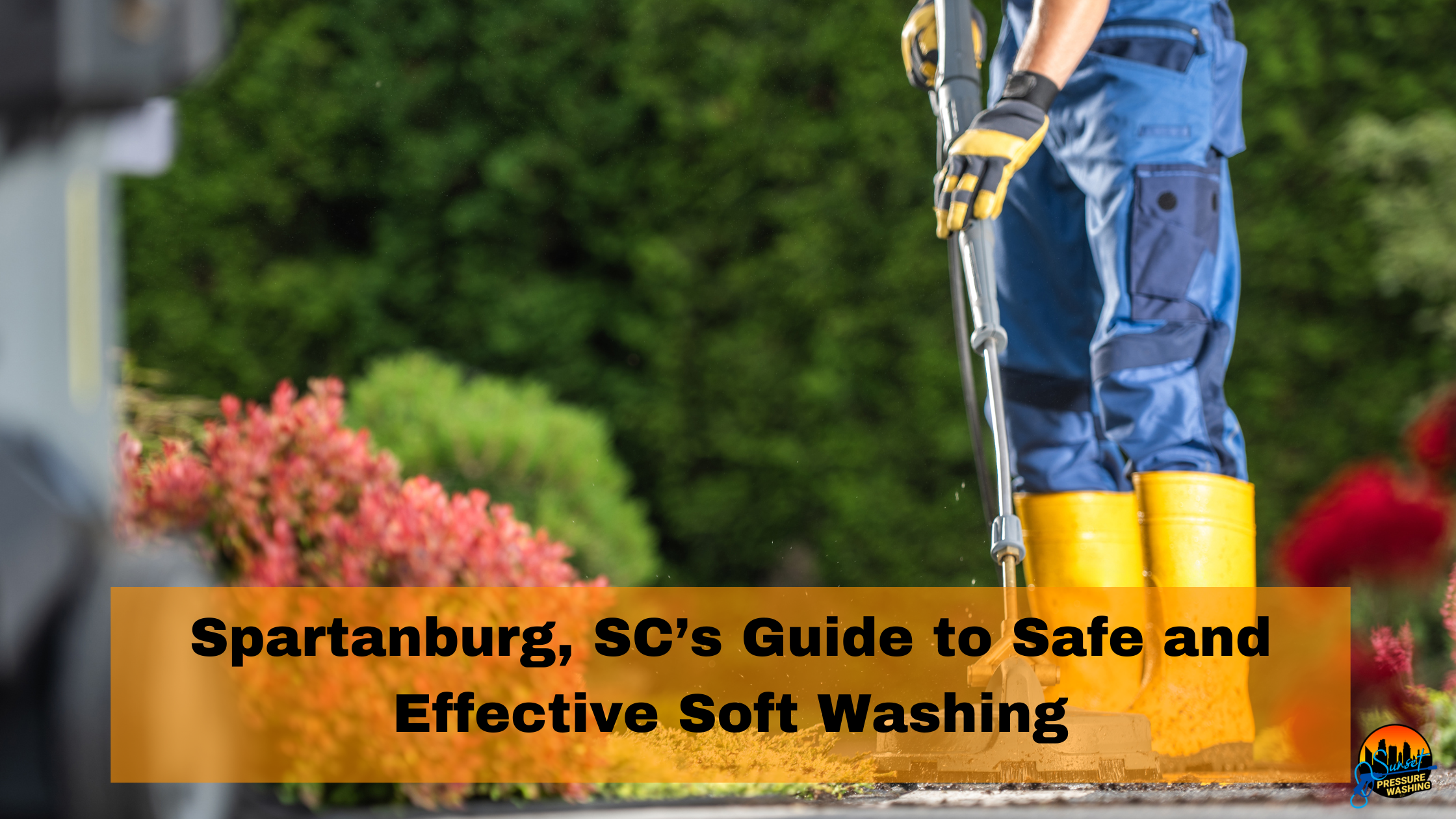
Soft washing is a gentle yet effective cleaning technique used on buildings, particularly in areas like Spartanburg, SC, where the architecture can vary from historic to modern. This method uses low-pressure water combined with specific cleaning solutions to remove dirt, mold, mildew, and other biological elements from exterior surfaces without causing damage.
Understanding Soft Washing
Soft washing is a crucial maintenance technique for property owners, particularly those with delicate surfaces that cannot withstand the force of high-pressure washing. This section breaks down the method, its application, and why it is an essential technique for maintaining the integrity of various building materials.
What is Soft Washing?
Soft washing is a cleaning method that uses low-pressure water combined with specific cleaning agents to safely remove dirt, mold, mildew, algae, and other organic stains from exterior surfaces. This technique is less abrasive compared to traditional high-pressure washing, making it ideal for more fragile surfaces such as roof shingles, wood paneling, and soft stone.
How Does Soft Washing Work?
The process begins by applying a specially formulated cleaning solution to the surface, which is designed to target and destroy biological elements like mold and algae. The solution typically contains a mixture of bleach for sanitization, surfactants for deeper penetration into grime, and sometimes specific algaecides or mildewcides. These ingredients work together to loosen the undesired deposits from the surface without the need for high pressure.
Key Components of the Cleaning Solution
- Bleach: Acts as a disinfectant and sanitizer, killing mold, algae, and bacteria.
- Surfactants: Help the cleaning solution adhere to the surface and penetrate more deeply into the grime and organic matter.
- Algaecides and Mildewcides: These are sometimes added to specifically target algae and mildew, preventing their quick recurrence.
Benefits of Using Soft Washing
Soft washing extends the life of materials that could degrade under the force of high pressure. It’s also more effective in killing and removing organic-based stains than pressure washing alone. The method does not only clean but also sanitizes surfaces, offering a longer-lasting cleanliness by addressing the root cause of the growths.
Appropriate Uses for Soft Washing
Soft washing is particularly beneficial for cleaning:
- Roof tiles and shingles
- Wood siding and decking
- Vinyl siding
- Soft stone patios and pathways
- Other painted or treated surfaces that can be easily damaged
Benefits of Soft Washing in Spartanburg
Soft washing offers numerous advantages, particularly in a city like Spartanburg, SC, where varying weather conditions can foster the growth of mold, mildew, and algae on buildings. Understanding these benefits can help homeowners and business owners appreciate why soft washing is often the preferred method for maintaining exterior cleanliness and property integrity.
Enhanced Longevity of Building Materials
One of the primary benefits of soft washing is its gentle approach, which significantly reduces the risk of damage to your property. Traditional pressure washing can erode surface materials such as shingles, siding, and even concrete, leading to premature aging and the need for repairs or replacement. Soft washing, on the other hand, uses low-pressure water and effective cleaning solutions that clean deeply without compromising the integrity of the material.
Effective Removal of Biological Contaminants
Soft washing excels in eliminating organic growths such as algae, mold, and mildew, which are prevalent in Spartanburg’s humid climate. These contaminants not only detract from the appearance of your property but can also cause health issues and structural damage over time. The cleaning solutions used in soft washing contain ingredients that kill these organisms at their roots, providing a more thorough clean and helping prevent their quick return.
Safety for Landscaping and Environment
The soft wash method is typically safer for the surrounding landscaping than high-pressure washing. The controlled application of cleaning solutions minimizes runoff, which means less risk of harming plants and the environment. Additionally, many soft washing solutions are designed to be eco-friendly, degrading harmlessly after application.
Cost-Effectiveness
By extending the life of exterior surfaces and reducing the frequency of cleanings needed, soft washing can be more cost-effective in the long run. The method addresses not just surface dirt but also the underlying issues causing growths and stains. This comprehensive approach means that surfaces stay cleaner for longer periods, decreasing the overall maintenance costs.
Boosts Property Aesthetics and Value
A clean, well-maintained property has curb appeal and holds or increases in value better over time. Soft washing restores the original beauty of your property’s exterior without the risk of damage, enhancing its appeal and potentially boosting its market value. This is particularly beneficial for homes and commercial properties in competitive markets like Spartanburg.
Supports Healthier Living Environments
Removing harmful biological materials from your property also improves the health conditions within. Mold and mildew can contribute to poor air quality and respiratory problems. By effectively removing these with soft washing, you contribute to a healthier living or working environment.
Compliance with Local Regulations
Spartanburg residents can also benefit from soft washing as it often complies with local regulations concerning water use and chemical runoff. This compliance helps property owners avoid fines and contributes to community efforts to protect local waterways and ecosystems.
When to Choose Soft Washing Over Pressure Washing
Deciding between soft washing and pressure washing in Spartanburg involves understanding the specific needs of your property, the materials involved, and the type of dirt or organisms you are dealing with. Here are key scenarios and considerations that suggest when soft washing might be the more appropriate choice over traditional pressure washing.
Delicate Exterior Surfaces
Soft washing is ideal for cleaning surfaces that can be damaged by high pressure, such as:
- Roof shingles: High-pressure washing can lift or break shingles, leading to leaks.
- Wood siding and decks: Pressure washing can strip away protective finishes and splinter wood.
- Stucco and soft stone: High pressure can erode these materials, causing pitting and other damage.
Choosing soft washing for these materials ensures they are cleaned effectively without risking structural integrity.
Presence of Biological Growth
If your property has significant growth of mold, mildew, algae, or moss, soft washing is generally more effective than pressure washing. The cleaning solutions used in soft washing are specifically designed to target and kill these organisms at their root level, preventing quick regrowth. This is particularly useful in Spartanburg’s humid climate, where such growths are common and can be stubborn.
Environmental and Regulatory Considerations
Soft washing often uses biodegradable chemicals and requires less water than pressure washing, making it a more environmentally friendly option. If there are strict local regulations regarding chemical use and water runoff in Spartanburg, soft washing may help you stay compliant while still achieving excellent cleaning results.
When Sanitization is Required
In scenarios where sanitization is as important as cleaning—such as in the aftermath of a storm or if there’s been an outbreak of an illness around your property—soft washing is preferable. The chemical solutions can be tailored to not only clean but also sanitize areas, offering an additional level of protection.
Long-Term Maintenance
For long-term maintenance, soft washing can be more beneficial as it offers deeper, more lasting results compared to pressure washing. By addressing the root cause of dirt and biological growth, soft washing ensures that surfaces remain clean for longer periods, reducing the frequency and overall cost of maintenance.
Historical or Specialty Buildings
If you are dealing with historical structures or buildings with specialty coatings or features, soft washing is the safer option. It ensures that you can clean effectively without risking the degradation of historical elements or protective coatings, which are often susceptible to damage from high-pressure water streams.
The Right Chemicals for Soft Washing
Choosing the right chemicals is crucial for effective and safe soft washing, especially in residential and commercial settings in Spartanburg, SC. The chemicals used not only determine the effectiveness of the cleaning but also impact the environment and the longevity of the surfaces being cleaned. Here’s a guide to selecting and using the appropriate chemicals for soft washing.
Understanding the Chemical Components
Soft washing solutions typically consist of several key components:
- Bleach (Sodium Hypochlorite): This is the primary cleaning agent in most soft washing solutions. It effectively kills mold, algae, bacteria, and other organic stains. It must be diluted properly to be safe for use on various surfaces and to minimize environmental impact.
- Surfactants: These are added to the cleaning solution to enhance the sticking ability of the solution to vertical surfaces and to increase penetration into the dirt and biofilm. This results in a more thorough cleaning.
- Algaecides and Fungicides: Specific chemicals that target algae and fungi, ensuring that these organisms are not only removed but also prevented from quickly returning.
Choosing Eco-Friendly and Safe Chemicals
When selecting chemicals for soft washing, it’s essential to consider their environmental impact, especially in communities sensitive to ecological balance like Spartanburg. Look for:
- Biodegradable Formulas: Chemicals that break down into non-toxic components after use are preferable as they reduce environmental damage.
- Low VOC (Volatile Organic Compounds) Content: Products with low VOC levels help maintain air quality and reduce pollution.
- Phosphate-Free Solutions: Phosphates can lead to algal blooms in water bodies; therefore, choosing phosphate-free solutions helps protect local waterways.
Customizing Chemical Mixes for Specific Needs
Different surfaces and levels of dirt or biological growth may require different chemical concentrations or additional components:
- Mildew-Prone Areas: Increase the fungicide component in areas that tend to develop mildew.
- High Traffic Areas: For surfaces that accumulate dirt quickly, a stronger surfactant mix might be needed to break down grime efficiently.
- Sensitive Surfaces: For delicate surfaces, a lower concentration of sodium hypochlorite or a milder alternative might be necessary to prevent damage.
Handling and Safety Precautions
Proper handling and application of chemicals are vital to ensure safety and effectiveness:
- Proper Dilution: Follow manufacturer instructions for dilution ratios to ensure safety for surfaces and minimize harm to plants and animals.
- Protective Gear: Always wear protective gear, including gloves, goggles, and masks, when mixing and applying chemicals.
- Application Techniques: Apply chemicals using equipment designed for soft washing to control the flow and spread of the solution, ensuring it does not drift to unintended areas or run off quickly.
Step-by-Step Guide to Soft Washing Your Home
Soft washing is an effective method for cleaning the exterior of your home, particularly when dealing with delicate surfaces or biological contaminants like mold, mildew, and algae. Here’s a detailed guide on how to soft wash your home safely and effectively, ensuring you protect your investment and enhance your property’s appearance.
Gather the Necessary Equipment and Materials
Before you begin, make sure you have all the necessary equipment and materials:
- Soft wash system or a low-pressure washer
- Cleaning solutions suitable for soft washing, including bleach, surfactants, and potentially algaecides
- Protective gear, such as gloves, goggles, and protective clothing
- Garden hose with an adequate water supply
- Ladder (if needed to reach higher areas)
Prepare the Area
Preparing the area is crucial to ensure safety and efficiency:
- Clear the vicinity of any movable objects such as outdoor furniture, planters, and vehicles.
- Protect delicate landscaping by covering plants or watering them thoroughly to dilute any potential chemical runoff.
- Close all windows and doors to prevent any water or chemicals from entering the home.
Mix the Cleaning Solution
Follow the instructions for your specific soft wash chemicals to create the right mix:
- Dilute the cleaning solution according to the manufacturer’s guidelines, usually in a large tank that feeds your soft wash system.
- Test the solution on a small, inconspicuous area of your home to ensure it does not damage the surface.
Apply the Cleaning Solution
Using the soft wash system, apply the cleaning solution to your home’s exterior:
- Start from the bottom and work your way up to prevent streaking and ensure thorough coverage.
- Use a low-pressure setting to spray the solution evenly across surfaces.
- Allow the solution to sit for a recommended period, usually around 10 to 15 minutes, to let the chemicals break down the dirt and kill any biological growth.
Rinse the Surface
After the solution has had time to work:
- Rinse the surface using a garden hose or the low-pressure washer, starting from the top and moving downwards to ensure all the cleaning solution and loosened debris is washed away.
- Ensure all areas are thoroughly rinsed to prevent damage from the cleaning chemicals.
Inspect and Touch Up
Once the main cleaning is done:
- Inspect your home’s exterior for any spots that might have been missed or need additional cleaning.
- Apply a touch-up solution if necessary, following the same apply-and-rinse procedure.
Clean Up
Proper clean-up is essential to conclude your soft washing:
- Store all equipment safely for future use.
- Dispose of any leftover solutions according to local regulations to ensure environmental safety.
- Uncover and rinse any plants or areas that were protected to remove any potential residue.
Regular Maintenance
To keep your home looking its best:
- Schedule regular soft wash sessions (usually once or twice a year) to prevent buildup and deterioration.
- Monitor the exterior for any early signs of mold or mildew, particularly in damp or shaded areas.
Scheduling and Preparation
Once you choose a provider, scheduling and preparation are the next steps:
- Schedule at a convenient time: Consider weather conditions and personal convenience.
- Prepare your property: Follow any instructions from the service provider to move furniture or cover plants, similar to if you were doing the job yourself.
Aftercare and Maintenance
After the service is completed:
- Inspect the work: Make sure all areas have been thoroughly cleaned and there are no missed spots or damage.
- Ask for maintenance tips: Professional cleaners can provide advice on how to maintain the cleanliness of your home until the next service.
Compliance and Environmental Considerations
When implementing soft washing techniques in Spartanburg, SC, it’s crucial to consider both regulatory compliance and the environmental impact of the cleaning methods and chemicals used. This ensures not only the safety of your property but also the broader community and natural surroundings.
Understanding Local Regulations
Spartanburg may have specific ordinances that regulate the use of certain chemicals and methods for cleaning residential and commercial properties, particularly in ways that affect stormwater runoff or wastewater systems:
- Check with local authorities: Before starting a soft washing project, consult Spartanburg’s environmental protection agency or local government offices to understand any regulations or permits required.
- Permit requirements: Depending on the scale of your project and the chemicals used, you might need to obtain a permit to ensure compliance with local environmental and safety standards.
Choosing Eco-Friendly Chemicals
The selection of cleaning solutions should prioritize environmental safety:
- Biodegradable solutions: Opt for chemicals that naturally break down into non-toxic substances that won’t harm the environment.
- Low toxicity: Choose solutions that have minimal impact on wildlife and plant life, especially those that claim reduced effects on aquatic life if runoff is a concern.
- Efficiency of use: Select concentrated formulas that require less product for the same level of effectiveness, reducing overall chemical usage.
Managing Chemical Runoff
Proper handling of runoff is essential to prevent contamination of local waterways and to protect the landscape around your property:
- Containment strategies: Implement measures to contain and collect runoff, especially if using stronger chemicals. This might include setting up barriers or capturing runoff in tanks.
- Water treatment: Consider systems that can treat water before it’s discharged, especially when working near sensitive ecosystems or in urban areas with strict runoff regulations.
Safe Application Techniques
Ensuring that chemicals are applied safely helps minimize environmental impact and personal exposure:
- Training and equipment: Use properly calibrated equipment to apply chemicals evenly and efficiently, and train all users in safe and effective application techniques.
- Protective measures for vegetation: Cover or wet down nearby plants and grass before application to protect them from chemical spray or runoff.
Monitoring and Reporting
Ongoing monitoring and adherence to reporting guidelines are essential to remain compliant and to address any environmental concerns promptly:
- Document chemical usage: Keep records of the types and amounts of chemicals used, along with any incidents or issues related to their application.
- Regular inspections: Conduct periodic inspections of your equipment and application methods to ensure they remain in compliance with local regulations and best practices.
Community Engagement and Education
Engaging with the community and educating residents about the importance of environmentally responsible cleaning practices can lead to broader compliance and improved environmental outcomes:
- Public education initiatives: Participate in or sponsor local events focused on environmental conservation to raise awareness about the safe use of cleaning chemicals.
- Collaboration with local organizations: Work with environmental groups or regulatory bodies to ensure your cleaning practices are up-to-date and environmentally friendly.
Maintenance Tips Post Soft Washing
After soft washing your home in Spartanburg, SC, proper maintenance is key to prolonging the effects of the clean and preserving the condition of your property. Here are essential tips to ensure that your home continues to look its best and remains protected from the elements and organic growth.
Regular Inspections
- Check for Regrowth: Regularly inspect your home for signs of mold, mildew, or algae regrowth. Early detection can prevent the need for another full soft wash and might be manageable with spot treatments.
- Examine Surfaces for Damage: After soft washing, keep an eye on the condition of your home’s exterior surfaces. Look for any changes or damage that might have been uncovered by the cleaning process.
Cleaning Between Soft Washes
- Gentle Rinsing: Periodically rinse off your home’s exterior with a garden hose to remove dust and debris. This prevents buildup and maintains the appearance of your home without the need for harsh chemicals.
- Spot Cleaning: For minor spots of dirt or organic growth, use a mild cleaning solution and a soft brush to gently clean areas without waiting for a full soft wash cycle.
Protecting Sensitive Areas
- Seal Surfaces: Consider applying a protective sealant to vulnerable surfaces like wood or stone. This can help repel water and prevent the growth of mold and algae.
- Trim Vegetation: Keep bushes, trees, and plants trimmed back from your home. This improves air circulation and sunlight exposure, which can help keep surfaces dry and less hospitable to organic growth.
Adjusting Drainage and Moisture Control
- Improve Drainage: Ensure that your home’s gutters are clean and downspouts direct water away from the foundation. Proper drainage helps minimize water accumulation that can lead to mold and algae growth.
- Address Moisture Issues: Identify and fix any sources of excess moisture around your home, such as leaking faucets or poor drainage areas, which can promote unwanted organic growth.
Educating Yourself and Others
- Stay Informed: Keep up with the latest recommendations and products for exterior home care and maintenance. Use resources from local home care professionals or online forums.
- Educate Household Members: Make sure everyone in your home understands the importance of maintaining the exterior and what they can do to help, such as promptly reporting leaks or drainage issues.
Enhance Your Spartanburg Property with Expert Soft Washing
Soft washing is a crucial method for preserving the aesthetics and integrity of your property in Spartanburg, SC. By understanding the appropriate techniques, chemicals, and maintenance tips, you can ensure your home remains in excellent condition. If you’re ready to enhance your property’s appearance with professional help, Sunset Pressure Washing offers specialized soft washing services designed for maximum effectiveness and safety. Explore our range of services here, learn more about our commitment to quality, or book your service directly here to ensure your home looks its best.
